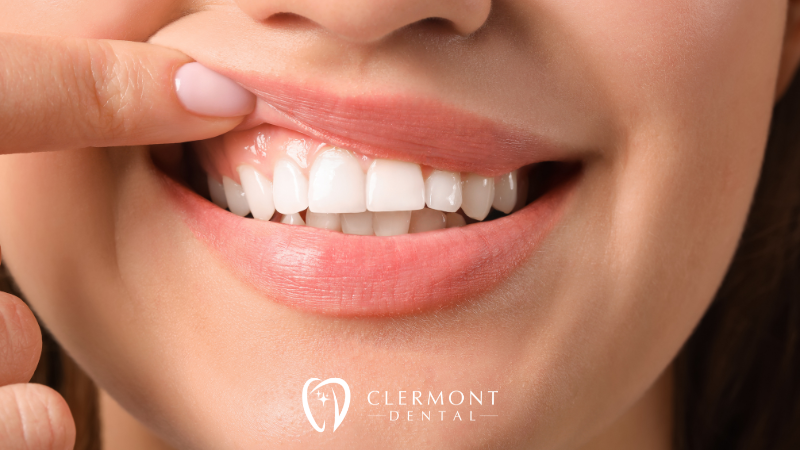Bad breath, or halitosis, is a common condition that affects millions of people worldwide. The unpleasant odor can often cause embarrassment and anxiety, impacting one’s personal and professional life. Although bad breath can be caused by various factors, including poor oral hygiene, underlying medical conditions, and diet, prevention and treatment are possible. In this blog post, we’ll discuss seven practical ways to deal with bad breath.
- Maintain Proper Oral Hygiene
The most common cause of bad breath is poor oral hygiene, which allows the bacteria in your mouth to break down food particles and produce foul-smelling gasses. Therefore, it’s crucial to maintain a proper oral hygiene routine to keep your breath fresh and healthy.
Brush your teeth twice a day, floss at least once a day, and use an antiseptic mouthwash to clean your mouth. Plus don’t forget to brush your tongue! Did you know that the tongue can harbor odor-causing bacteria? Scraping your tongue can help eliminate that bad breath and here’s how to do it:
- Use a tongue scraper or the back of your toothbrush to gently scrape from the back of your tongue to the front.
- Rinse your mouth thoroughly afterward.
2. Drink Plenty of Water
Dry mouth, or xerostomia, is a common cause of bad breath due to decreased saliva flow. Drinking plenty of water helps to flush out the bacteria and food particles in your mouth and promotes saliva production. Aim to drink at least eight glasses of water a day and limit alcohol and caffeine consumption, as they can contribute to dry mouth.
- Avoid Foods That Cause Bad Breath
Certain foods, especially those with strong odors, can linger in your mouth and cause bad breath. Foods like onions, garlic, and spicy foods are notorious for causing lingering bad breath, whilst dairy products, sugary foods, and beverages can create an environment for bacteria to thrive and produce odors.
These foods contain strong-smelling sulfur compounds that can be absorbed into your bloodstream and emitted through your breath. How you may ask?
Basically, your mouth is where all of the food you eat starts to break down. It is then absorbed into your bloodstream, travels to the lungs, and impacts the quality of the air you exhale. When we consume foods with potent aromas, like garlic or onions, mouthwash, flossing, and brushing will only briefly mask the odor. The smell won’t totally go until the food has been digested by your body.
Therefore, if you’re a fellow foodie like us and need that extra flavor in life then we advise that one limits their consumption of these foods to reduce the likelihood of bad breath or avoid them altogether if you’re prone to bad breath.
- Quit Smoking
Smoking is not only harmful to your overall health but also a leading cause of bad breath. Tobacco products can stain your teeth and tongue, promote dry mouth, and increase the risk of gum disease, all of which contribute to bad breath.
Quitting smoking is difficult, but seeking professional help and support can help you succeed in breaking the habit and improving your breath.
- Chew Sugarless Gum
Chewing sugarless gum after meals can help stimulate saliva production, neutralize acid in your mouth, and mask bad breath. Choose a gum that contains xylitol, as it helps reduce the number of bacteria in your mouth and prevent dental caries. However, don’t rely on gum as a substitute for proper oral hygiene.
- Use MouthWash/Natural Remedies
Mouthwash is an effective way to help avoid halitosis, as it can help to remove food particles and bacteria from the mouth. It is important to choose a mouthwash that contains ingredients that will kill the bacteria in the mouth, such as zinc or chlorhexidine.
Similarly, several natural remedies can help alleviate bad breath by neutralizing odors and promoting oral health. Here are some examples:
- Peppermint oil: Add a few drops of peppermint oil to a glass of water and use it as a mouthwash to freshen breath and promote oral health.
- Tea tree oil: Mix a few drops of tea tree oil with water and gargle with it to reduce the bacteria in your mouth and freshen breath.
- Baking soda: Mix a teaspoon of baking soda with water and use it as a mouthwash to neutralize bad odors and promote oral health.
- Visit Your Dentist Regularly
When it comes to preventing and treating bad breath, visiting your dentist regularly is crucial. Dr. Safavi or your local dentist can diagnose and address any underlying dental issues, such as gum disease or cavities, that can contribute to bad breath. They can also provide professional cleanings and offer advice on maintaining proper oral hygiene.
In conclusion, bad breath can be a bothersome condition that can affect both your physical and emotional well-being. However, by practicing proper oral hygiene, avoiding certain foods, drinking plenty of water, quitting smoking, and seeking professional help, you can alleviate your bad breath and promote better oral health. Try incorporating these tips into your daily routine and enjoy the confidence of fresh, healthy breath.
If you’re struggling with bad breath, contact us at Clermont Dental for a consultation. Our team of dental professionals can help you identify and address the underlying causes of your bad breath and provide the necessary treatment. With our help, you can enjoy a brighter, healthier, and fresher smile.








